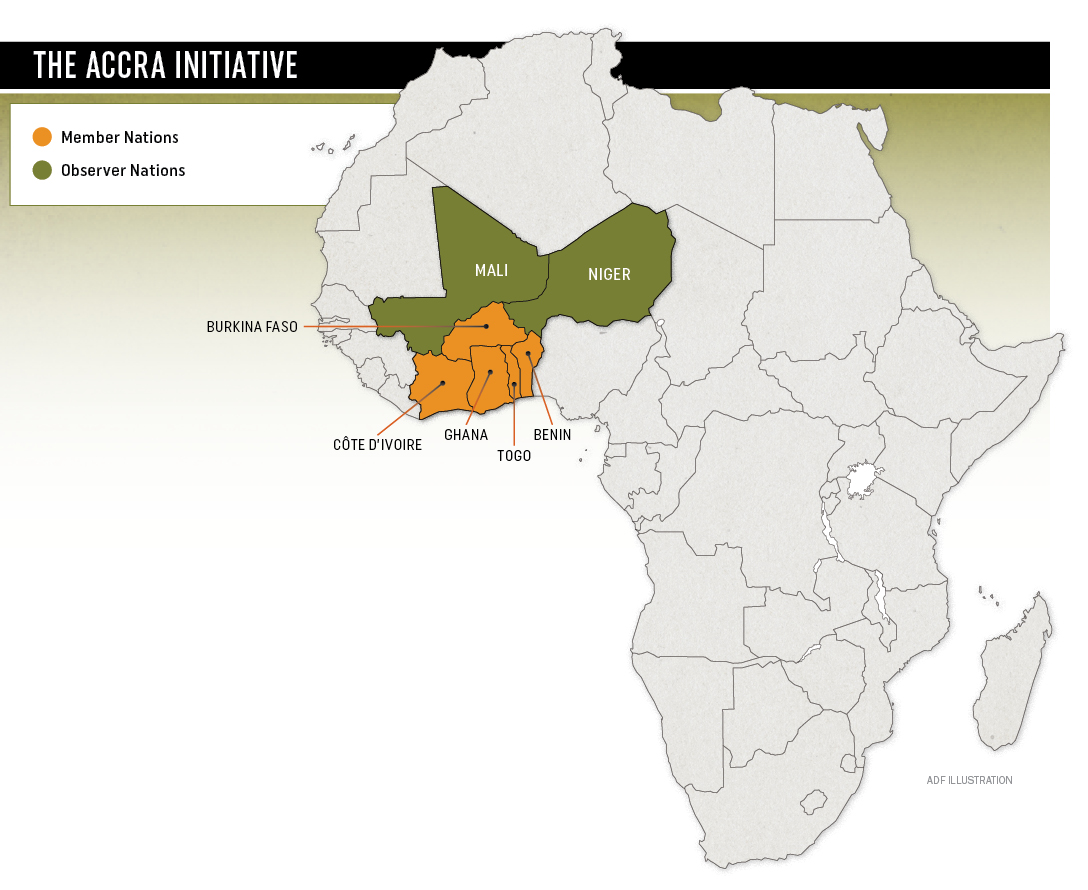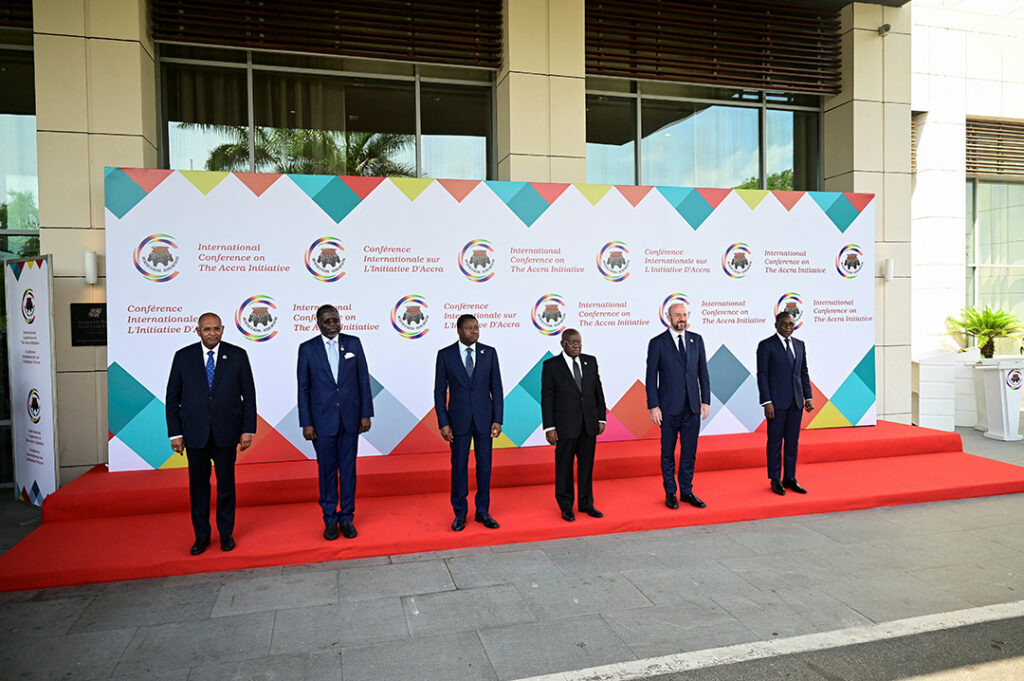ADF STAFF
Five years after its formation, Accra Initiative has agreed to assemble a multinational military force to help stop the spread of violent extremism spilling out of the Sahel toward West African coastal nations.
A meeting of the International Conference on the Accra Initiative in Accra, Ghana, on November 21 and 22 addressed the continuing danger of extremist violence in Sahelian states and the threat it poses to neighboring West African coastal nations.
“The situation is worrying and quite alarming,” Albert Kan-Dapaah, Ghana’s national security chief, told The Africa Report. “We cannot sit unconcerned. No country is safe from the nefarious activities of these terrorists, so we have to put our resources together to deal with the jihadists.”
Benin, Burkina Faso, Côte d’Ivoire, Ghana and Togo established the Accra Initiative in 2017 in
response to the growing regional extremist threat. Two years later, Mali and Niger joined as observers. The initiative focuses on three areas: training, cross-border military operations, and information and intelligence sharing.
The conference approved the deployment of 2,000 Soldiers to Burkina Faso within one month as part of the Multinational Joint Task Force/Accra Initiative (MNJTF/AI), according to Agence de Presse Africaine (APA), a Senegal-based news service. The task force comprises 10,000 Soldiers, most of whom will be stationed in Tamale, Ghana, with an intelligence component in the Burkinabe capital, Ouagadougou.
 The deployment is aimed at countering a mix of extremist groups that have wreaked havoc in Burkina Faso for several years. The violence — much of it now linked to al-Qaida and the Islamic State group — began in Mali in 2012 and has steadily proliferated into Burkina Faso and beyond. Extremist leaders have explicitly stated their intentions to expand toward the Gulf of Guinea coast, primarily through Côte d’Ivoire and Benin.
The deployment is aimed at countering a mix of extremist groups that have wreaked havoc in Burkina Faso for several years. The violence — much of it now linked to al-Qaida and the Islamic State group — began in Mali in 2012 and has steadily proliferated into Burkina Faso and beyond. Extremist leaders have explicitly stated their intentions to expand toward the Gulf of Guinea coast, primarily through Côte d’Ivoire and Benin.
This new task force joins a similarly named military effort formed by Lake Chad Basin nations Cameroon, Chad, Niger and Nigeria along with Benin in 2014 that committed 8,000 troops to the fight against Boko Haram militants.
The MNJTF/AI force will undertake Operation Enhanced Koudanlgou after a briefing from Ghana Chief of Defence Staff Vice Adm. Seth Amoama, according to The Sun, a Nigerian newspaper.
Accra Initiative forces conducted Operations Koudanlgou I, II and III between May 2018 and November 2019. The first addressed cross-border security among Burkina Faso, Ghana and Togo. Burkina Faso, Côte d’Ivoire and Ghana conducted the second operation, and Togo and Ghana cooperated in the third.
These border operations led to the arrest of about 700 suspected gang members and terrorists, and the confiscation of some weapons, according to The Africa Report.
Despite recent drawdowns by European forces in the Sahel, the Accra Initiative is receiving funding from the European Union, said Charles Michel, president of the European Council, which oversees EU political matters.
Michel said 135 million euros (more than $142 million) already has been committed through 2024 for border controls, intelligence capacity enhancements, conflict prevention and infrastructure protection “for the security and stabilization” of the northern parts of coastal states Benin, Côte d’Ivoire, Ghana and Togo.
The MNJTF/AI is expected to require $550 million to operate, and member states intend to raise money to cover the costs, APA reported, which could include funding from the African Union, the EU, the Economic Community of West African States and Great Britain.
Nigeria has agreed to join the task force headquarters as an observer and provide valuable air and logistical support, APA reported.
Giovanie Biha, United Nations deputy special representative for West Africa and the Sahel, told conference attendees that they will “need to ensure a consistent response that combines the military approach with long-term interventions aiming to address the governance deficits noted in affected communities,” according to the U.N. Office for West Africa and the Sahel.
Among the nonmilitary concerns are youth unemployment, which makes civilians vulnerable to recruitment by terrorist and extremist groups.
“Current levels of unemployment and under-employment among young men and women in West Africa constitute a political-security concern,” Patrick Osei-Kufuor, a senior research fellow with the Department of Peace Studies of the University of Cape Coast, Ghana, told The Africa Report.
Kan-Dapaah told The Africa Report that regional leaders know that extremists use unemployment as a basis for recruitment and radicalization.
“We are absolutely concerned,” he said. “Job creation is also high on our agenda. We don’t want to have a situation beyond our control, so we will also make it difficult for the jihadists to radicalise youth in border communities.”

